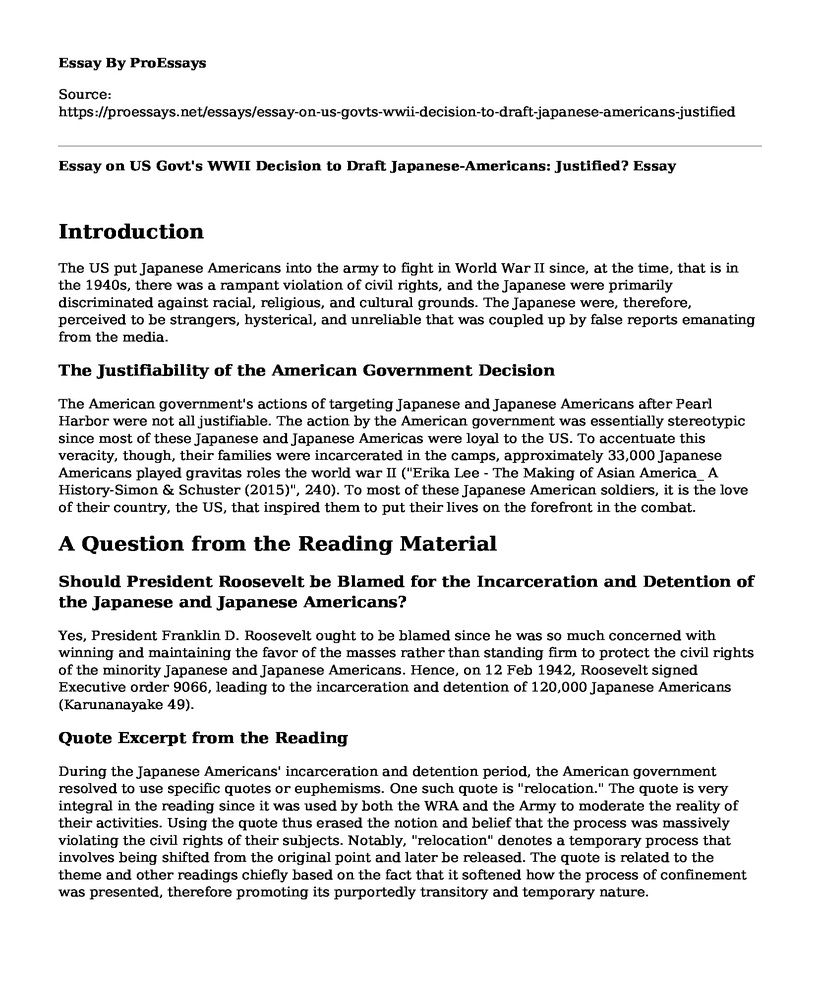Introduction
The US put Japanese Americans into the army to fight in World War II since, at the time, that is in the 1940s, there was a rampant violation of civil rights, and the Japanese were primarily discriminated against racial, religious, and cultural grounds. The Japanese were, therefore, perceived to be strangers, hysterical, and unreliable that was coupled up by false reports emanating from the media.
The Justifiability of the American Government Decision
The American government's actions of targeting Japanese and Japanese Americans after Pearl Harbor were not all justifiable. The action by the American government was essentially stereotypic since most of these Japanese and Japanese Americas were loyal to the US. To accentuate this veracity, though, their families were incarcerated in the camps, approximately 33,000 Japanese Americans played gravitas roles the world war II ("Erika Lee - The Making of Asian America_ A History-Simon & Schuster (2015)", 240). To most of these Japanese American soldiers, it is the love of their country, the US, that inspired them to put their lives on the forefront in the combat.
A Question from the Reading Material
Should President Roosevelt be Blamed for the Incarceration and Detention of the Japanese and Japanese Americans?
Yes, President Franklin D. Roosevelt ought to be blamed since he was so much concerned with winning and maintaining the favor of the masses rather than standing firm to protect the civil rights of the minority Japanese and Japanese Americans. Hence, on 12 Feb 1942, Roosevelt signed Executive order 9066, leading to the incarceration and detention of 120,000 Japanese Americans (Karunanayake 49).
Quote Excerpt from the Reading
During the Japanese Americans' incarceration and detention period, the American government resolved to use specific quotes or euphemisms. One such quote is "relocation." The quote is very integral in the reading since it was used by both the WRA and the Army to moderate the reality of their activities. Using the quote thus erased the notion and belief that the process was massively violating the civil rights of their subjects. Notably, "relocation" denotes a temporary process that involves being shifted from the original point and later be released. The quote is related to the theme and other readings chiefly based on the fact that it softened how the process of confinement was presented, therefore promoting its purportedly transitory and temporary nature.
Works Cited
"Erika Lee - The Making of Asian America_ A History-Simon & Schuster (2015)." www.mediafire.com/file/v1uzca2953kkcuk/Erika_Lee_-_The_Making_of_Asian_America__A_History-Simon_%2526_Schuster_%25282015%2529.
Karunanayake, D. "Keywords for Asian American Studies ed. by Cathy J. Schlund-Vials, Linda Trinh Vo, K. Scott Wong." Journal of Asian American Studies, vol. 19, no. 2, 2016, pp. 267-270, doi:10.1353/jaas.2016.0026.
Martinez, G. "Inside One Man's Trip to the Idaho Camp Where His Great-Grandparents Were Held During World War II." 19 Feb. 2019, time.com/5531184/minidoka/.
Cite this page
Essay on US Govt's WWII Decision to Draft Japanese-Americans: Justified?. (2023, Mar 26). Retrieved from https://proessays.net/essays/essay-on-us-govts-wwii-decision-to-draft-japanese-americans-justified
If you are the original author of this essay and no longer wish to have it published on the ProEssays website, please click below to request its removal:
- Research Paper on Container Deposit Laws
- Essay Example on the Weakness of Technology in Warfare
- Essay Sample on The Abolitionist Movement: Ending Slavery and Fuelling Debate
- Essay Example on Troy Maxson: A Man of Strength, Hard Work, and Imagination
- Addressing Consumer Privacy: Governments and Businesses Working Together - Essay Sample
- Report on Revolutionary Alliance: Past and Present Goals for China's Liberation and Reconstruction
- Essay on Life inside the Cape Coast Castle







